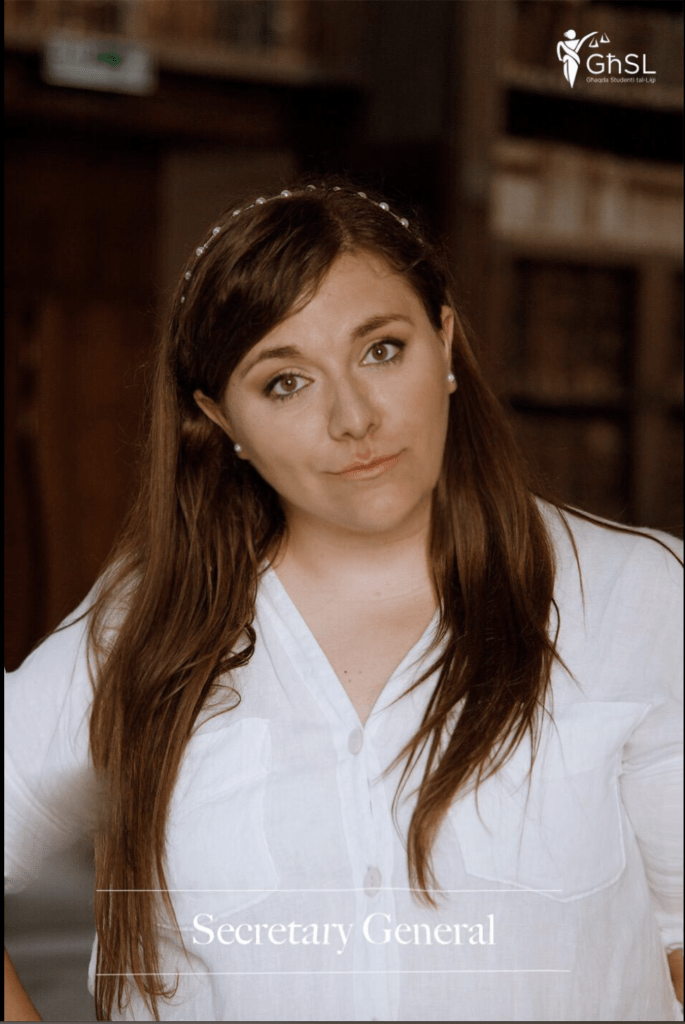
Maya Spiteri Dalli is a law student at the University of Malta. As a member of GħSL, she had a significant role in creating the policy paper advocating for gender equality. Most notably, the paper called for the decriminalisation of abortion, free and accessible contraception, and an almost complete reform of the Malta sexual health policy draft. This paper has garnered nationwide attention and stands as one of the first of its kind, being a significant move for Malta’s legal history and women’s rights. We sat down with Maya as she walked us through the process of creating the document, her role in its creation and her hopes for what it may achieve in Malta.
What is your role in GħSL? Tell me about the responsibilities this entails.
Currently, I am Secretary General of the organization; however, before this I took the role of Policy Officer, hence being the task leader for the abortion policy paper. My colleagues and I, Matthew Charles and Valentina oversee the general executive and we work together on a consistent basis. Admittedly, where I excel in some stuff, but lack in others, Matthew Charles fills in the gap of designing material for GħSL and Valentina is the go to person for liaising an event. My role more specifically involves organizing the Executive Meetings of the Organization, helping where I can in every office and where I am needed and stepping in when the others can’t.
What was the driving force behind creating the legal document on sexual and reproductive health?
A few months ago, the Policy Subcommittee deliberated on a list of possible topics that required a legal insight. The Policy Office already boasts a great portofolio, having previously, handled subjects such as euthanasia and human trafficking, therefore discussing abortion was almost a natural step.
What are the main objectives of the legal document?
The same process and objective applies for all our papers to get the outcome desired, that is a well researched and insightful paper, handling the subject from a general perspective and, if need be, constructing proposals that the legislator should consider. Another objective that I would say emanated with the publication of this paper was getting people to discuss in a mature manner and in such a way that no matter their counterpart’s belief, respect is maintained throughout.
What do you, as an organisation, hope the document will achieve?
We hope that this document supplements the information and research already published on the topic and we hope that whatever legislative framework that forms the basis of any changes in the future, this document is a main point of reference. We hope that people will read it objectively and decide for themselves, and form as a contribution for our ever changing society. Some people overlook student activism and/or organizations as entities for mere exposure, but working hands on with students on this paper, proved to me that this is far from the truth. Students remained objective, loyal to the facts and open minded, not to mention we openly discussed other matters.
What kind of work did the creation of the document involve?
Given how highly debated this topic was, it took quite some time, more accurately a year and two different executive boards in the making! We got experts to peer review it from different fields. Admittedly, we are law students, despite how much we wish to understand everything, we need to remember that some things are better left to the experts in a certain field and where reference needs to be made, reference should be made.
Some dedicated committee members have meticulously done research for the paper and contributed to the subject in a much needed way, the proposals could only be done after the general research was carried out.
The design of the paper also took some considerations, I explained to Matthew Charles, President of GħSL, that we did not want the design to reflect only one perspective, but rather, a combination of both, in that everyone is taken into account for the work they do.
Who/what did you have in mind when drafting this document?
Rather than who we had to have in mind, I think it was what we had to consider, and the situation, not just in Malta, but in the entire world. Usually, we compare ourselves to our European Counterparts, forgetting what there is beyond the borders of Europe. We also had to take into consideration that this was for some, a very sensitive subject, so the way of even handling this subject, the drafting and the terminology used needed some extra attention and context! What we also had to take into account was that this subject can be very divisive, therefore, taking an objective approach to research was imperative and to be honest, when compelling all the contributions that the contributors had given me and we had the final product, what I had in mind was how strong my next cup of coffee would be!
Do you believe that the objectives outlined in the document are achievable within the near future?
In essence, while I would love to give a concrete answer, I don’t believe it is up to us to answer that. We have, by publishing this paper, that it has set the bar for others to consider this subject and initiate discussion. Our paper, rather than full on aiming on simply discussing abortion, goes one step further and sets a blue print for the entire sexual health and education field, on what grounds abortion should be decriminalized in that before even considering the subject, one must make general reform.
For example, the Women’s Rights and Gender Equality Committee that we suggested should be formed in the Maltese House of Representatives is based on a similar committee found in the European Parliament, so this is not entirely a new concept.
In what way will the objectives help women and other marginalised groups?
In all honesty, the objectives aim at helping everyone! By making contraceptive use more accessible to everyone, it helps parties in a relationship. By creating a women’s rights and gender equality committee in the House of Representatives, it will give time for our MPs to face situations where they must think heads on and ensure gender equality in all aspects. Admittedly, with regards to decriminalisation of abortion, rather than enforce it, we think that it is better that rather than impose a prison sentence on women who undergo the procedure, that prison sentence should be scrapped and instead, promote counseling. Admittedly, counseling is the more empathetic approach for anyone in such a situation.
Would you consider your stance as “bold” or simply natural?
It’s a question that we ourselves cannot answer, as we cannot possibly adopt a layman’s perspective, and act as final arbiters on the influence that this paper can, and may have, on the general discourse related to Abortion. We do believe that our work is extremely valuable in the present time, and we’re immensely proud of the sheer size of it, however only time will tell whether our aims have been met.
Nevertheless, this isn’t to say that our decision to write on this topic was based on impulse, or even naivete. On one hand, we are aware that the debate on Abortion, while undergoing for quite some time, is still very much a taboo subject, and that our paper, notwithstanding the nomenclature used in our proposals, was going to face a substantial amount of opposing feedback merely on the subject-matter. On the other hand, ignoring the tangible effects that such laws currently have to women of all ages, from different socio-economic backgrounds, in our country, would have perhaps been more convenient, but it would lead to us shirking from our responsibility and future lawyers and activists in the field.
Why do you believe that abortion services should be decriminalised and accessible?
When one examines the context in which we as Maltese find ourselves in, including how abortion services are offered in neighbouring countries, what we have is a law which imposes a prison sentence on any such women who undergoes an abortive procedure.
Notwithstanding any argument posed, by prominent local jurists mind you, that the law at present acts as merely a moral guideline for the rest of society to follow on the inherent value of all life, we sincerely believe that the discriminatory practices emanating from such a law outweighs any moral, ethical or political significance that these couple of law purport to possess. And only if such abortion services are able to operate without unnecessary fear of criminal punishment and retribution, and equally accessible to all those who seek it irrelevant of their socio-economic backgrounds, can we ensure that the unlevel playing field which currently exists in our society, is removed once and for all.
We highlight repeatedly that if one can deviate from a prison sentence, counseling is a better and more empathetic option for both parties in the equation.


Emily Galea is a writer and feminist activist in Malta. She is the Vice-President of Young Progressive Beings, Project Co-lead of the Dear Decision Makers campaign, and MA student in Gender, Society & Culture at the University of Malta.





